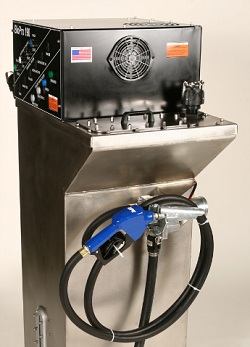 The maker of a biodiesel processor intended to turn waste grease and other feedstocks into the green fuel has announced one of its processor is now in its 50th school.
The maker of a biodiesel processor intended to turn waste grease and other feedstocks into the green fuel has announced one of its processor is now in its 50th school.
This press release from California-based Springboard Biodiesel says that Arkansas State University is the latest college and school system in the U.S. that has installed one of their systems … in this case, the BioPro 190, a fully-automated machine that converts 50 gallons of vegetable or animal oil into ASTM-grade biodiesel for less than $1 a gallon:
 Announcing this milestone, Springboard Biodiesel’s CEO Mark Roberts explained, “Now, more than ever, universities, colleges and high school systems across the US are looking for ways to save money and reduce their carbon footprint. Making biodiesel out of cooking oil collected from a school’s cafeterias and restaurants gives any college, university or high school system the opportunity to make ASTM-grade biodiesel in a fully-automated machine, for only $0.95 cents a gallon.” Roberts added: “From a budget perspective, that’s compelling. But many of these same institutions are striving to reduce their campus greenhouse gas emissions and by converting waste cooking oil into a fuel that burns up to 90% cleaner than regular diesel, BioPro™ biodiesel production is an immediate and effective way to help institutions meet their goals.”
Announcing this milestone, Springboard Biodiesel’s CEO Mark Roberts explained, “Now, more than ever, universities, colleges and high school systems across the US are looking for ways to save money and reduce their carbon footprint. Making biodiesel out of cooking oil collected from a school’s cafeterias and restaurants gives any college, university or high school system the opportunity to make ASTM-grade biodiesel in a fully-automated machine, for only $0.95 cents a gallon.” Roberts added: “From a budget perspective, that’s compelling. But many of these same institutions are striving to reduce their campus greenhouse gas emissions and by converting waste cooking oil into a fuel that burns up to 90% cleaner than regular diesel, BioPro™ biodiesel production is an immediate and effective way to help institutions meet their goals.”
“Safety was a very important consideration when we chose to purchase a BioPro™,” said Dr. Kevin Humphrey, The Director for Agricultural Education at Arkansas State University. “After all, students are the ones who will be working with this equipment, so we are obviously very safety conscious.” He added, “When you take into account the automation and the rugged construction of the BioPro™, then you know that safety was an important factor in its design.”
The school plans to use oils from soybeans, canola and camelina grown on the university’s research farm, as well as waste cooking oils from the college’s cafeterias, to make biodiesel to be used in the university’s tractors, trucks and diesel irrigation motors.
 A lack of investment capitol is taking its toll on a Georgia cellulosic ethanol plant.
A lack of investment capitol is taking its toll on a Georgia cellulosic ethanol plant. 







 The
The  A webinar on messaging for the biofuels industry will be held Wednesday, January 26 from 2:00 – 3:00 PM central time.
A webinar on messaging for the biofuels industry will be held Wednesday, January 26 from 2:00 – 3:00 PM central time.